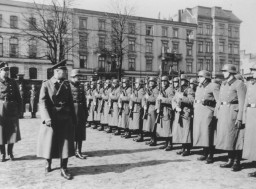You searched for: warsaw
<< Previous | Displaying results 371-380 of 487 for "warsaw" | Next >>
-
Ruth Berkowicz Segal describes receiving visa to leave Lithuania
Oral HistoryWhen German forces invaded Poland in September 1939, Ruth's father fled to eastern Poland. Upon the Soviet occupation of eastern Poland, he fled to Lithuania. Ruth left Warsaw with two friends to find her father and later joined him in Vilna. After Soviet forces occupied Lithuania, Ruth and her father obtained transit visas for Japan, but only Ruth obtained a Soviet exit visa. Her father insisted she leave and not wait for him. Ruth traveled by the Trans-Siberian Railroad across the Soviet Union to…
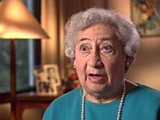
-
Susan Bluman describes fleeing to Vilna after the occupation of Poland
Oral HistorySusan was 19 years old when Germany invaded Poland in September 1939. Her boyfriend, Nathan, was in Lvov when the Soviet Union occupied eastern Poland. Nathan sent a guide to Warsaw to bring Susan to the Soviet zone of occupied Poland. Her parents reluctantly agreed after Susan promised to return to Warsaw within two weeks. Upon her arrival in Lvov, Susan married Nathan. The couple then fled across the Lithuanian border to Vilna, where they stayed for a year. They received a visa for transit through Japan…
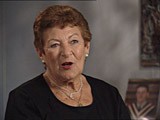
-
Susan Bluman describes obtaining a transit visa from Chiune Sugihara
Oral HistorySusan was 19 years old when Germany invaded Poland in September 1939. Her boyfriend, Nathan, was in Lvov when the Soviet Union occupied eastern Poland. Nathan sent a guide to Warsaw to bring Susan to the Soviet zone of occupied Poland. Her parents reluctantly agreed after Susan promised to return to Warsaw within two weeks. Upon her arrival in Lvov, Susan married Nathan. The couple then fled across the Lithuanian border to Vilna, where they stayed for a year. They received a visa for transit through Japan…
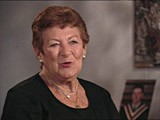
-
Raszka (Roza) Galek Brunswic describes her decision, while posing as a Polish Catholic, to work on a farm in Germany
Oral HistoryRoza's family moved to Warsaw in 1934. She had just begun college when Germany invaded Poland in 1939. In 1940, the Germans sealed the Warsaw ghetto, where her parents were shot during a roundup. Roza escaped and went into hiding. From her hiding place she saw the burning of the ghetto in the 1943 uprising. She had false papers stating she was a Polish Catholic (Maria Kowalczyk), and was deported by cattle train to Germany in June 1943. She worked on a farm until liberation in 1945.
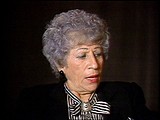
-
William (Bill) Lowenberg describes the importance of bonds of friendship among young people imprisoned in the Westerbork camp
Oral HistoryAs a boy, Bill attended school in Burgsteinfurt, a German town near the Dutch border. After the Nazis came to power in Germany in January 1933, Bill experienced increasing antisemitism and was once attacked on his way to Hebrew school by a boy who threw a knife at him. In 1936, he and his family left Germany for the Netherlands, where they had relatives and thought they would be safe. However, after Germany invaded the Netherlands in May 1940, antisemitic legislation--including the order to wear the Jewish…
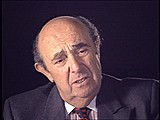
-
William (Bill) Lowenberg describes Zionist and cultural activities in the Westerbork camp
Oral HistoryAs a boy, Bill attended school in Burgsteinfurt, a German town near the Dutch border. After the Nazis came to power in Germany in January 1933, Bill experienced increasing antisemitism and was once attacked on his way to Hebrew school by a boy who threw a knife at him. In 1936, he and his family left Germany for the Netherlands, where they had relatives and thought they would be safe. However, after Germany invaded the Netherlands in May 1940, antisemitic legislation--including the order to wear the Jewish…
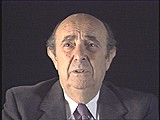
-
Sophie Turner-Zaretsky describes her years in Poland living under a false identity
Oral HistorySophie was born Selma Schwarzwald to parents Daniel and Laura in the industrial city of Lvov, two years before Germany invaded Poland. Daniel was a successful businessman who exported timber and Laura had studied economics. The Germans occupied Lvov in 1941. After her father's disappearance on her fifth birthday in 1941, Sophie and her mother procured false names and papers and moved to a small town called Busko-Zdroj. They became practicing Catholics to hide their identities. Sophie gradually forgot that…
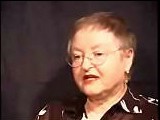
-
Combating Holocaust Denial: Evidence of the Holocaust presented at Nuremberg
ArticleAt the Nuremberg trials, Allied prosecutors submitted documentation left by the Nazi state itself. This evidence is a lasting refutation of attempts to deny the Holocaust.

-
1942: Key Dates
ArticleExplore a timeline of key events during 1942 in the history of Nazi Germany, World War II, and the Holocaust.
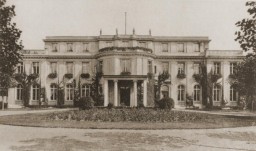
-
The Order Police
ArticleThe Order Police (Ordnungspolizei, Orpo) were Nazi Germany’s uniformed police forces. They became perpetrators of horrific crimes and played a significant role in the Holocaust.
